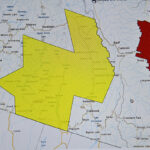Home »

Magnolia Wind
By Peter Christensen
Op-Ed Commentary
 ‘Magnolia Wind’, a song written by Guy Clark and performed by John Prine and Emmylou Harris, came up on my Facebook feed. It’s a song about bereavement, about losing a loved one. When I heard Prine and Harris sing “I’d rather not walk, through the garden again, if I can’t catch your scent, on a Magnolia Wind,” I was deeply moved, a rare moment where the performer’s intensity and passion take the listener to another world.
‘Magnolia Wind’, a song written by Guy Clark and performed by John Prine and Emmylou Harris, came up on my Facebook feed. It’s a song about bereavement, about losing a loved one. When I heard Prine and Harris sing “I’d rather not walk, through the garden again, if I can’t catch your scent, on a Magnolia Wind,” I was deeply moved, a rare moment where the performer’s intensity and passion take the listener to another world.
It did not matter that I have not actually experienced the scent of Magnolia. It is human to have an imagination that can be fired by robust descriptions and passionate refrain. A certain fragrance or notion comes to mind and randomly triggers analogous thoughts such as the state of Canada’s relationship with the US of A? The bond between these two nations was forged on battlefields and is bolstered by mutual benefit. We share a love of story and song. This partnership is something to be cherished and respected, so when this nearly sacred relationship is toyed with, it questions long-held perspectives?
In 1943 Sophie Scholl, a student and anti-Nazi activist said, “How can we expect righteousness to prevail when there is hardly anyone willing to give himself up individually to a righteous cause?” These words were reported to have been said by her in 1943, her last words before being executed by guillotine. At least, so we experience in the 2005 film, Sophie Scholl: The Final Days. This film asks the audience to reflect upon her courage and strength of character. It asks the viewer to take seriously this question of what is a righteous cause, what notions should be played with or not?
It is this relationship, the Canada/US relationship, that I am thinking about today as I reflect on how carelessly the value of the partnership was used in our recent election. President Trump toyed with Justin Trudeau by calling him “Governor of a proposed 51st State.” Prime Minister Carney and the Liberal Party used this teasing to play on the inferiority that Canadians feel living next to a powerful state that is militarily and culturally dominant.
Less scrupulous politicos played up remarks by the ‘emperor’ next door in a desperate move to stir up anti-Americanism and motivate voters to forget the track record of the Liberal government. The longest undefended border in the world that facilitates positive relationships in heavy industry, resource development, medicine, transportation and most consumer goods, rather than being seen as good thing was played as a threat. There is no greater motivator than fear.
We were reminded by our media that our history is dissimilar than that of the USA because Canada was not founded on revolution and violence, though this is a lie, as any Metis or First Nation person will tell you. Let’s not deceive ourselves, as in all countries power is defined by the acquisition of territory and then, if its’ citizens are lucky, more civilized notions prevail and a carefully constructed Constitution fabricates a balance between order and truth. On the whole we prosper.
The scent drifting across from the south is tantalizing; it is the scent of a beautiful women carried on a Magnolia wind. Powerful and successful empires produce great art and export controversial ideas. These tantalizing notions are alluring. Even so Canadians hold to social notions like multiculturalism, provincialism and winter.
Democracies are not static nor fixed, rather they are a style of government along a continuum. Was this a critical period in Canada’s history? Was it a time of unscrupulous political machinations? Time will tell.
– Peter Christensen is a Columbia Valley based writer and poet.







